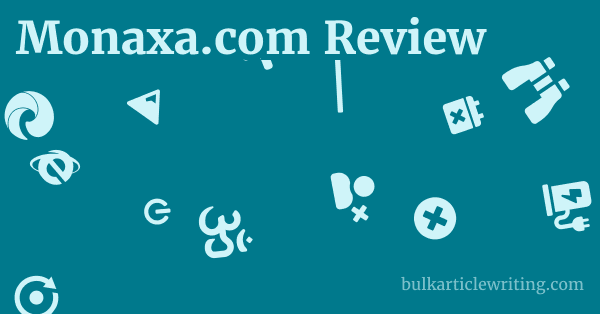Avoiding problematic trading platforms like Monaxa.com is crucial for protecting your financial well-being and ensuring your investments align with ethical principles.
Read more about monaxa.com:
Monaxa.com Review & First Look
Is Monaxa.com Legit?
Monaxa.com Pros & Cons (Focus on Cons)
This involves a proactive approach to due diligence, prioritizing transparency and regulatory compliance over flashy marketing or promises of quick riches.
Understanding the red flags and knowing what to look for can save you from significant losses and ethical compromises.
Prioritize Regulatory Verification
Always, without exception, check for regulatory licenses. This is your first line of defense.
|
0.0 out of 5 stars (based on 0 reviews)
There are no reviews yet. Be the first one to write one. |
Amazon.com:
Check Amazon for How to Avoid Latest Discussions & Reviews: |
- Search Regulatory Databases: If a platform claims to be regulated, verify it directly on the regulator’s official website (e.g., FCA register in the UK, FINRA BrokerCheck in the US, ASIC website in Australia). Do not rely on links provided by the platform itself, as these can be fraudulent.
- Understand Jurisdiction: Be aware of where the platform is regulated. Regulation in a weak, offshore jurisdiction might offer minimal protection compared to a highly reputable financial hub.
- Cross-Reference Information: Ensure the company name, license number, and registered address on the regulator’s site match exactly with what the platform claims. Discrepancies are a major red flag. Example: If a broker claims to be regulated by the FCA, go to the FCA’s Financial Services Register and search for the firm name or reference number.
Demand Full Transparency on Fees and Services
A legitimate platform will have nothing to hide when it comes to how they operate and how they charge.
- Detailed Product Offerings: The website should clearly list all tradable assets (e.g., specific currency pairs, commodities, stock indices) and whether they are real assets or derivatives (like CFDs).
- Comprehensive Fee Schedules: Look for transparent information on spreads, commissions (including any monaxa commission equivalents), swap rates, withdrawal fees, inactivity fees, and any other potential charges. This information should be easily accessible, often in a “Fees” or “Pricing” section.
- Clear Account Types: Details on minimum deposits, leverage options, margin call policies, and execution models (e.g., STP, ECN, Market Maker) should be readily available.
Look for Robust Risk Disclosures
Ethical and legitimate financial service providers understand and communicate the inherent risks.
- Prominent Risk Warnings: A responsible trading platform will display clear, bold risk warnings on its homepage and throughout its site. These usually state that trading derivatives carries significant risk and that you can lose more than your initial deposit.
- Educational Resources: Legit platforms often provide educational materials, webinars, and demo accounts to help users understand the market and practice trading without real money, emphasizing learning over immediate profit. Fact: Many national financial regulators require specific risk warnings for high-risk products.
Assess Customer Support and Corporate Information
Strong, accessible customer support and clear corporate identity are indicators of legitimacy.
- Multiple Contact Channels: Look for phone numbers, live chat, physical addresses, and email support. The availability of multiple channels suggests a commitment to client service.
- Company Background: Search for information about the company’s history, its management team, and its parent company. A well-established company with a public profile is generally more trustworthy.
- Independent Reviews: While direct website information is primary, also cross-reference with independent review sites (e.g., Trustpilot, reputable industry forums). Be wary of overwhelmingly positive or negative reviews that seem unnatural.
Ethical Considerations (Especially for Islamic Finance)
Beyond legitimacy, evaluate platforms for ethical compliance. Monaxa.com Pros & Cons (Focus on Cons)
- Avoid Riba (Interest): Ensure the platform does not charge or pay interest on deposits, withdrawals, or overnight positions (swaps). Seek out “Islamic accounts” or “swap-free accounts” if derivatives trading is considered, but even then, deeper scrutiny is needed.
- Avoid Gharar (Excessive Uncertainty) & Maysir (Gambling): The core nature of many speculative trading instruments can fall under these prohibited categories. Focus on platforms that deal with real assets, productive investments, or services that genuinely benefit society. Trading based purely on price speculation without tangible asset ownership or productive activity is often problematic.
- Focus on Halal Alternatives: Instead of speculative trading, consider investing in real estate, ethical businesses, Sharia-compliant funds (Sukuk, Halal ETFs), or direct entrepreneurship. These avenues foster real economic growth and align with Islamic principles of permissible earnings. Resource: Consult resources from organizations like the Accounting and Auditing Organization for Islamic Financial Institutions (AAOIFI) for guidance on Sharia standards.
By diligently applying these principles, you can navigate the complex world of online finance and avoid platforms that may lead to financial harm or ethical compromise.

Leave a Reply